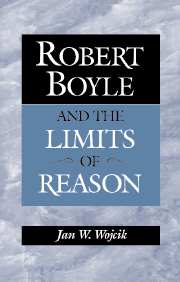Book contents
- Frontmatter
- Contents
- Preface
- Acknowledgments
- Introduction
- Part I The Theological Context
- Part II The Context of Natural Philosophy
- 5 Philosophies of Nature and their Theological Implications
- 6 Sources of Knowledge
- 7 The Limits of Reason and Knowledge of Nature
- 8 Boyle's Voluntarism and the Limits of Reason
- Conclusion
- Bibliography
- Index
5 - Philosophies of Nature and their Theological Implications
Published online by Cambridge University Press: 24 November 2009
- Frontmatter
- Contents
- Preface
- Acknowledgments
- Introduction
- Part I The Theological Context
- Part II The Context of Natural Philosophy
- 5 Philosophies of Nature and their Theological Implications
- 6 Sources of Knowledge
- 7 The Limits of Reason and Knowledge of Nature
- 8 Boyle's Voluntarism and the Limits of Reason
- Conclusion
- Bibliography
- Index
Summary
In Part II, I examine the relationship between Boyle's views on the limits of human reason and his conception of the task of the natural philosopher. The fact that I am now switching from an explicit discussion of theology in Boyle's thought to a discussion of his natural philosophy does not by any means involve leaving theological considerations behind; indeed, it is the central thesis of this book that Boyle's theological beliefs significantly influenced his view of the proper task of the natural philosopher. In many passages of various so-called “scientific” works, Boyle made his theological concerns quite clear, and when he did so I will be quick to note them. At other times, however, he seemed to think that he could isolate his concerns as a natural philosopher from his concerns as a lay theologian. This is evident in the fact that on numerous occasions he identified himself as speaking not as a Christian virtuoso, but as a natural philosopher who was excluding theological considerations from a given discussion. In A Disquisition about Final Causes, for example, he ended one discussion by stating that he had been speaking “meerly upon physical grounds,” and then introduced his next point by announcing that “if the revelations contained in the holy scriptures” might be admitted he could offer other arguments concerning God's ends in nature.
- Type
- Chapter
- Information
- Robert Boyle and the Limits of Reason , pp. 121 - 136Publisher: Cambridge University PressPrint publication year: 1997



